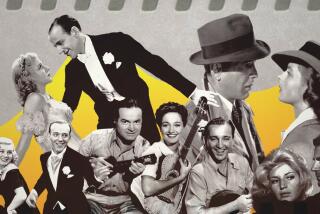A Bonanza of Vintage Chaplin
- Share via
For more than 70 years, audiences have laughed at the genius of Charlie Chaplin while watching prints of his movies that were as badly abused as film could be--scratched, out-of-focus, faded, shown at the wrong speed, retitled by people Chaplin would have thrown off the lot, often shown with atrocious music and ridiculous sound effects.
This sorry state of affairs has continued with poorly duplicated videotapes copied from faded 16-millimeter prints. Image Entertainment has tried to rectify the situation with a beautifully produced three-disc set called “The Chaplin Mutuals” ($80), the 1991 Blackhawk edition of the complete Charles Chaplin Mutual comedies. (They are also available on three separate discs for $40 each.)
These fresh 35mm prints, made under film historian David Shepard’s supervision, are clean and sharp, with black-and-white images that capture all of Chaplin’s physical comedy and elaborate comic ideas. The original intertitles have been restored and great pains have been taken to show the film at its correct projection speed.
The 12 comic shorts included--each about 25 minutes and originally released in 1916 and 1917--are considered some of Chaplin’s best work. In these restored prints, you can pick up subtleties and facial expressions not seen for decades.
These and other “silent” films were never shown in silence; most theaters had a piano or organ, and the best often had small orchestras. Image’s new digitally recorded stereo scores by Michael Mortilla are a mixed blessing. Sometimes they fit the action, other times they seem out of sorts, misleading and in the way. Play the music at a low level.
Four Landmark-Laservision discs of unrestored Blackhawk films long available on video--”Charlie Chaplin: The Early Years” ($40)--continue the disgraceful line of poor sound effects and aren’t worth the transfer to laser.
Image also has resurrected Chaplin’s earliest work, “Chaplin Lost and Found,” at Keystone (one volume, $30) and Essanay (two volumes, $40 each). The Keystone prints are atrocious, the musical score barely adequate. Chaplin left Keystone Studios in 1914 to become the highest paid feature player for the Essanay Film Manufactoring Co. of Chicago; images struck off these works are better and the musical soundtrack a little less annoying.
Image also has released one of the finest documentaries ever produced on the silent-film era, “The Unknown Chaplin” (Thames Video Collection, 157 minutes, $60). This Thames Television production, written and produced by historian Kevin Brownlow and David Gill, is an impeccable production, including entire scenes cut from final release prints and footage long thought destroyed. James Mason’s narration is wonderful and the music, specially composed by Carl Davis, is what other Chaplin releases should try to emulate.
More to Read
The biggest entertainment stories
Get our big stories about Hollywood, film, television, music, arts, culture and more right in your inbox as soon as they publish.
You may occasionally receive promotional content from the Los Angeles Times.










